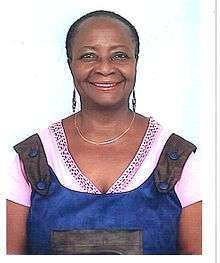Molara Ogundipe
| Molara Ogundipe | |
|---|---|
 | |
| Born |
Abiodun Omolara Ogundipe 1940 Lagos, Nigeria |
| Nationality | Nigerian |
| Occupation | Poet, critic, editor, feminist, activist |
Omolara Ogundipe-Leslie (born 1940), also known as Molara Ogundipe, is a Nigerian poet, critic, editor, feminist and activist. Considered one of the foremost writers on African feminism, gender studies and literary theory, she is a social critic who has come to be recognized as a viable authority on African women among black feminists and feminists in general.[1] She contributed the piece "Not Spinning on the Axis of Maleness" to the 1984 anthology Sisterhood Is Global: The International Women's Movement Anthology, edited by Robin Morgan.[2]
Life
Born Abiodun Omolara Ogundipe in Lagos, to a family of educators and clergy, she graduated (BA English Honours) as the first Nigerian with a first-class degree from the University of London. She later earned a doctorate in Narratology (the theory of narrative) from Leiden University, one of the oldest universities in Europe. She has taught English Studies, Writing, Comparative Literature and Gender from the perspectives of cultural studies and development at universities in several continents. She rose to prominence early in her career in the midst of a male-dominated artistic field concerned about the problems afflicting African men and women.
Over the years, she has been a critic of the oppression of women and has argued that African women are more oppressed in their status and roles as wives in view of their multiple identities, in some of which identities they enjoy status, privilege, recognition and agency. She criticizes the plight of African women as due to the impact of imposed colonial and neo-colonial structures that often place African males at the height of social stratification. Their plight is also due to the internalization of patriarchy by African women themselves.[3] She, however, insists on an understanding of the complexity of the statuses of African women in their pre-colonial and indigenous cultures for any useful discussion or study of African women.
Molara Ogundipe has been in the leadership of feminist activism and gender studies in Africa for decades. She now lives and works in West Africa, where she has been setting up writing centres at universities, in addition to her work on literature, gender and film, in contribution to her commitment to intergenerational education and mentoring.
Writing
She has written for numerous academic and general publications and has published books of non-fiction as well as a collection of poetry. Her work is included in anthologies of women's writing: her piece "Not spinning on the axis of Maleness" is in the 1984 anthology Sisterhood Is Global: The International Women's Movement Anthology, edited by Robin Morgan.[2] and poems by her are in the 1992 anthology Daughters of Africa.[4]
Criticism
Ogundipe is a Nigerian scholar, critic, educator and activist who is recognized as one of the foremost writers on African women and feminism. She argued for an African-centred feminism that she termed "Stiwanism" (Social Transformation in Africa Including Women) in her book Recreating Ourselves. A distinguished scholar and literary theorist, she has published numerous works of poetry and literary criticism in addition to her works cited below.
Ogundipe earlier in her career had posited that a true feminist writer had to understand or describe effectively a woman's viewpoint and how to tell the story about a woman. She strongly believes that rediscovering the role of women in Nigeria's social and political institutions may be the best way to improve those institutions. She is known as a writer whose works capture most vividly the complexities of African life. In Re-Creating Ourselves: African Women and Critical Transformations, she writes brilliantly about the dilemma of writing in her traditional language and men's resistance to gender equality.[1]
Books
- Sew the Old Days and Other Poems, 1985
- Re-Creating Ourselves: African Women & Critical Transformations, 1994
- (ed.) Women as Oral Artists, 1994
- (ed. with Carole Boyce-Davies) Moving Beyond Boundaries. April 1995 (two volumes).
- Gender and subjectivity. Readings of "Song of Lawino". Dissertation Leiden University. Leiden, CNWS, 1999
Notes
- 1 2 Douglas, Carol Anne, "Women in Nigeria Today", off our backs, Washington, 30 November 1987.
- 1 2 "Table of Contents: Sisterhood is Global". Catalog.vsc.edu. Retrieved 15 October 2015.
- ↑ Jane Kani Edward, "Issues of Concern for African Ferminists", in Sudanese Women Refugees: Transformations and Future Imaginings, Palgrave Macmillan, 2007, p. 55.
- ↑ Margaret Busby (ed.), Daughters of Africa, Jonathan Cape: 1992, p. 766.
References
- Gay Wilentz: "Review: Postcolonial / Postmodern: What's in a Wor(l)d?" College English, Vol. 56, No. 1 (January 1994).
- Gibreel M. Kamara: "The Feminist Struggle in the Senegalese Novel: Mariama Ba and Sembene Ousmane". Journal of Black Studies, Vol. 32, No. 2, November 2001.
- Allan, Tuzyline Jita: "Book reviews, Re-Creating Ourselves: African Women and Critical Transformations by Molara Ogundipe-Leslie". Research in African Literatures, Summer 1995.
- Ogundipe (a.k.a. Ogundipe-Leslie), M. Indigenous and Contemporary Gender Concepts and Issues in Africa: Implications for Nigeria’s development. Lagos, Benin, Ibadan, Jos, Oxford, Zaria: Malthouse Limited P., 2005.
External links
- "Desiree Lewis talks to Molara Ogundipe, leading feminist theorist, poet, literary critic, educator and activist, about the interface of politics, culture and education".